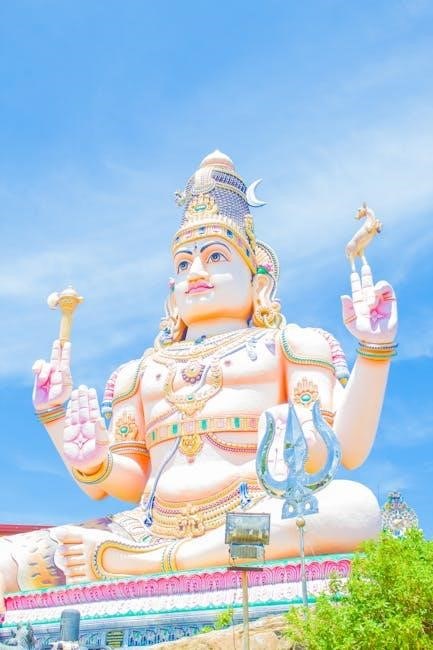The Shiva Sahasranamavali in Telugu PDF is a sacred hymn containing 1008 names of Lord Shiva, revered for its spiritual significance and devotional power in Hinduism.
The Shiva Sahasranamavali is a revered Hindu devotional text consisting of 1008 sacred names of Lord Shiva, each embodying his divine attributes and virtues. Originating from the Anushasana Parva of the Mahabharata, this hymn is considered a powerful tool for spiritual growth and devotion. It is widely cherished for its ability to connect devotees with the divine essence of Shiva, offering spiritual solace and enlightenment. The Telugu version of the Shiva Sahasranamavali is particularly significant for Telugu-speaking devotees, allowing them to recite and reflect on the names in their native language. This sacred text is often recited during worship, rituals, and personal meditation, making it a cornerstone of Hindu devotional practices.
1.2 Significance and Benefits of Chanting Shiva Sahasranamavali
Chanting the Shiva Sahasranamavali is deeply revered in Hinduism for its profound spiritual and emotional benefits. It is believed to mitigate karma, bestow divine blessings, and foster inner peace. Reciting these 1008 names helps devotees connect with Lord Shiva’s divine essence, fostering spiritual growth and self-realization. Regular chanting is said to bring prosperity, protect from adversity, and grant liberation from worldly bonds. The practice is also believed to enhance mental clarity, emotional stability, and character development. Many devotees incorporate this sacred hymn into their daily rituals, seeking solace and enlightenment. Its significance extends beyond individual benefits, often being recited during auspicious occasions and rituals to invoke blessings for the entire community.

Structure of Shiva Sahasranamavali
The Shiva Sahasranamavali consists of 1008 divine names of Lord Shiva, systematically arranged to reflect his attributes, powers, and spiritual significance, making it a revered structure in Hindu devotion.
2.1 The 1008 Names of Lord Shiva
The Shiva Sahasranamavali comprises 1008 sacred names of Lord Shiva, each reflecting his divine attributes, cosmic roles, and spiritual essence. These names are meticulously categorized into groups, highlighting Shiva’s various forms and qualities, such as his cosmic dance, benevolence, and destroyer of evil. Names like “Shambhu,” “Shankara,” and “Maheshwara” emphasize his protective and nurturing aspects, while others like “Rudra” and “Bhairava” signify his fierce and transformative powers. The names are derived from ancient scriptures, including the Mahabharata, and are arranged to inspire devotion and meditation; Each name carries profound meaning, offering devotees a deeper connection to Shiva’s divine nature and fostering spiritual growth. The structure ensures a comprehensive understanding of Shiva’s multifaceted personality, making it a revered text in Hindu spirituality.
2.2 Categories and Groupings of the Names
The 1008 names of Lord Shiva are thoughtfully categorized into distinct groups, reflecting his diverse attributes, roles, and spiritual significance. These groupings emphasize his benevolent and fearsome forms, cosmic duties, and symbolic representations. Names highlighting his nurturing aspects, such as “Shankara” and “Shambhu,” are grouped together, while those like “Rudra” and “Bhairava” underscore his powerful and transformative nature. Additionally, names associated with his cosmic roles, like “Maheshwara” and “Vishveshwara,” are clustered to signify his universal dominion. Such categorical arrangements not only aid in memorization but also deepen devotion and understanding of Shiva’s multifaceted personality. This structured approach ensures that each name resonates with its thematic relevance, fostering a meaningful connection for devotees engaging in recitation and reflection.

Availability and Download Options
The Shiva Sahasranamavali in Telugu PDF is readily available on platforms like Greater Telugu and Stotranidhi, ensuring easy access for devotees to download and use for worship.
3.1 Official Sources for the Telugu PDF
Official sources like Greater Telugu and Stotranidhi offer authentic versions of the Shiva Sahasranamavali in Telugu PDF, ensuring quality and accuracy for devotees seeking genuine spiritual content.
3.2 Tips for Downloading the PDF
When downloading the Shiva Sahasranamavali in Telugu PDF, ensure you verify the source for authenticity. Choose reputable websites like Greater Telugu or Stotranidhi to avoid unauthorized versions. Always opt for the latest updated version to access accurate content. Use a stable internet connection for uninterrupted downloads and consider saving the file in a dedicated folder for easy access. Be cautious of unofficial sites to prevent downloading malicious files. Additionally, check if the PDF includes transliterated text for better understanding. Ensure the file is in readable Telugu script and free from errors. By following these tips, you can securely and effectively obtain the Shiva Sahasranamavali PDF for spiritual use.
Language and Transliteration
The Shiva Sahasranamavali in Telugu PDF is written in the Telugu language, a prominent South Indian script. Transliteration is provided for non-Telugu speakers to facilitate easy recitation and understanding.
4.1 The Role of Telugu in the Sahasranamavali
Telugu, a prominent South Indian language, plays a vital role in the Shiva Sahasranamavali PDF, as it is widely revered for its cultural and devotional significance. The script’s beauty and clarity make it ideal for spiritual texts, ensuring the hymn’s sacredness is preserved. Telugu’s rich literary heritage and its association with Hindu scriptures emphasize its importance in conveying divine chants like the Sahasranamavali. The language’s melodious nature enhances the recitation experience, making it a popular choice for devotees. Additionally, Telugu’s widespread use in South India ensures accessibility to a large audience, fostering spiritual unity and devotion to Lord Shiva.
4.2 Transliteration for Non-Telugu Speakers
For non-Telugu speakers, transliterated versions of the Shiva Sahasranamavali are available, ensuring accessibility to the divine hymn. These transliterations use Roman script, making it easier for devotees worldwide to pronounce and recite the names correctly. The transliteration maintains the sanctity of the original text while bridging language barriers. This feature is particularly beneficial for those unfamiliar with Telugu script but eager to experience the spiritual benefits of chanting the Sahasranamavali. Many online resources and PDFs now include transliterated versions alongside the original Telugu text, promoting inclusivity and widespread devotion to Lord Shiva.

Cultural and Religious Significance
The Shiva Sahasranamavali holds profound cultural and religious significance, being a cornerstone of Hindu devotion, reflecting Lord Shiva’s omnipresence and divine attributes, and fostering spiritual harmony among devotees.
5.1 Importance in Hindu Devotional Practices
The Shiva Sahasranamavali holds a central place in Hindu devotional practices, being an integral part of daily rituals and ceremonies. It is chanted to seek Lord Shiva’s blessings, ward off adversities, and attain spiritual growth. Many devotees include it in their daily worship, believing it to be a powerful means of connecting with the divine. The hymn is also recited during significant religious events, such as Maha Shivaratri, to amplify its spiritual benefits. By chanting these names, devotees express deep reverence for Shiva’s omnipresent nature and seek liberation from worldly bonds. Its recitation is considered a sacred act that fosters inner peace, devotion, and a profound understanding of Shiva’s divine attributes.
5.2 Role in Spiritual and Ritualistic Observances
The Shiva Sahasranamavali plays a vital role in spiritual and ritualistic observances, serving as a cornerstone of Hindu religious ceremonies. It is often recited during pujas, homams, and other sacred rituals to invoke Lord Shiva’s blessings. Devotees believe that chanting these 1008 names cleanses the mind, brings prosperity, and offers protection from adversities. The hymn is also integral to spiritual practices like meditation and yoga, helping seekers attain a deeper connection with the divine. Its recitation is considered auspicious during key life events and ceremonies, embedding it deeply into Hindu spiritual traditions. This ancient text is not only a ritualistic tool but also a spiritual guide, fostering devotion and enlightenment in those who chant it with sincerity.
Tips for Effective Use
Chant the Shiva Sahasranamavali daily with devotion, understanding each name’s meaning, and maintain proper pronunciation for maximum spiritual benefit and connection with Lord Shiva.
6.1 Daily Recitation and Practice
Daily recitation of the Shiva Sahasranamavali fosters spiritual growth and mental clarity. Consistent practice enhances devotion and helps in overcoming life’s challenges. Chanting with concentration and understanding the meaning of each name deepens the connection with Lord Shiva. It is advisable to recite the Sahasranamavali during early morning or evening, ensuring a calm and pure environment. Regular practice not only strengthens faith but also brings peace and prosperity. For non-Telugu speakers, transliterated versions are available, making it accessible to all devotees. Emphasize proper pronunciation and sincerity to maximize the spiritual benefits of this sacred hymn.
6.2 Understanding the Meaning Behind Each Name
Understanding the meaning behind each name in the Shiva Sahasranamavali enhances the depth of devotion and spiritual connection. Each name carries profound symbolism, reflecting Lord Shiva’s attributes, roles, and divine essence. Delving into the meanings fosters a deeper appreciation of His universal presence and cosmic functions. Devotees can use translations, commentaries, and spiritual guides to grasp the significance of each name. This understanding not only enriches the chanting experience but also strengthens faith and reverence. Exploring the stories and legends associated with each name further illuminates its spiritual importance. By comprehending the meanings, one can align their thoughts and actions with the divine qualities embodied in Lord Shiva, leading to a more fulfilling and purposeful devotional practice.

The Shiva Sahasranamavali in Telugu PDF serves as a powerful tool for devotees seeking spiritual growth and divine connection. Its 1008 names encapsulate the essence of Lord Shiva, offering deeper insights into His divine attributes and universal presence. By chanting these names with devotion, one can experience profound spiritual benefits, including inner peace and liberation from worldly sorrows. The availability of the Sahasranamavali in Telugu PDF format makes it accessible to a wide audience, enabling daily recitation and reflection. Embracing this sacred text not only enriches one’s spiritual practice but also fosters a stronger bond with Lord Shiva, guiding devotees toward a path of enlightenment and self-realization.
